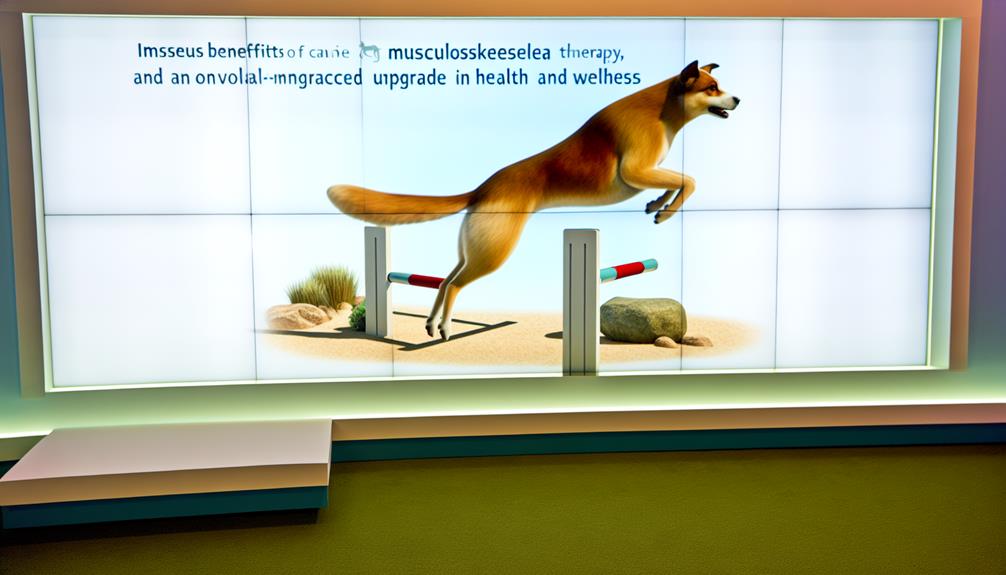
13 Feb 7 Best Canine Musculoskeletal Therapy Benefits
Imagine your beloved canine companion, a loyal friend who has been by your side through thick and thin. Now, picture them struggling to walk, their once energetic spirit dampened by joint pain and stiffness.
Canine musculoskeletal therapy offers a ray of hope in such situations, providing a range of benefits that can transform your furry friend's life. From reducing pain and inflammation to enhancing overall well-being, these therapies have the power to improve mobility, prevent future issues, and promote a healthier, happier life for your canine companion.
But that's just the beginning. Discover the seven best canine musculoskeletal therapy benefits that will leave you amazed at the wonders it can do for your furry friend.
Reduced Pain and Inflammation
How does canine musculoskeletal therapy help reduce pain and inflammation in dogs, improving their comfort and quality of life?
Canine musculoskeletal therapy is a holistic approach that targets muscle imbalances and tension to alleviate pain and inflammation in dogs. By utilizing specific techniques, this therapy promotes relaxation and releases muscle tension, leading to a decrease in discomfort and swelling in affected areas.
One of the key benefits of musculoskeletal therapy is its ability to improve circulation. By enhancing blood flow to the musculoskeletal system, this therapy aids in reducing inflammation and promoting healing. The targeted techniques used in the therapy address specific areas of pain and inflammation, providing much-needed relief for dogs with musculoskeletal issues.
Reducing pain and inflammation through musculoskeletal therapy is crucial for improving a dog's overall comfort and quality of life. When dogs experience less pain and inflammation, they're able to move more freely and engage in activities they enjoy. This newfound mobility enhances their physical and mental well-being, allowing them to lead a more fulfilling life.
In addition to reducing pain and inflammation, musculoskeletal therapy also has positive effects on a dog's emotional state. Dogs that are in discomfort may experience increased anxiety and stress. By alleviating pain and promoting relaxation, this therapy helps dogs feel more at ease, leading to an improved overall sense of well-being.
Increased Mobility and Flexibility
By undergoing canine musculoskeletal therapy, your dog will experience an enhanced range of motion and improved joint function.
This means that your furry friend will be able to move more freely and comfortably, allowing them to maintain an active lifestyle and explore their surroundings.
The therapy works to reduce stiffness and promote a wider range of motion, leading to better muscle function and overall physical well-being for your dog.
Enhanced Range of Motion
Canine musculoskeletal therapy enhances range of motion, allowing dogs to move with increased mobility and flexibility. This therapy focuses on the muscles and aims to reduce pain and improve mobility and flexibility. By targeting specific muscle groups and using techniques such as stretching and massage, the therapy helps to alleviate tension and tightness in the muscles, enabling the dog to move more freely and comfortably.
Improved flexibility not only allows dogs to perform activities with ease but also reduces the risk of muscle strains or injuries. Furthermore, enhanced range of motion supports proper joint function, aiding in overall mobility and agility. Dogs of all ages can benefit from increased flexibility in their daily movements, exercise routines, and playtime activities.
Musculoskeletal therapy helps maintain and improve flexibility as dogs age, promoting a healthier and more active lifestyle.
Improved Joint Function
Improved joint function enhances the mobility and flexibility of dogs, allowing them to move with increased ease and comfort. Canine musculoskeletal therapy plays a crucial role in achieving this by focusing on improving joint function through muscle therapy.
By targeting the muscles surrounding the joints, this therapy helps to support joint health and reduce stiffness and discomfort associated with joint issues. As a result, dogs experience a better range of motion and improved overall movement.
Whether your furry friend is active or a senior, regular musculoskeletal therapy sessions can help maintain and enhance joint function. This leads to increased comfort, agility, and overall quality of life for your beloved pet.
With improved joint function, your dog can enjoy a more active and fulfilling lifestyle, free from the limitations previously imposed by joint-related challenges.
Improved Musculoskeletal Function
Musculoskeletal therapy for dogs enhances their overall movement, improving muscle strength, flexibility, and coordination. By addressing musculoskeletal issues, this therapy aims to optimize the function of the muscles, joints, and bones in dogs, ultimately leading to improved mobility and quality of life. Let's take a closer look at how canine musculoskeletal therapy improves different aspects of musculoskeletal function:
| Benefits | Explanation |
|---|---|
| Improved muscle strength | Musculoskeletal therapy helps dogs build strength in their muscles, allowing them to support their body weight better. |
| Increased flexibility | Through targeted exercises and stretches, dogs can achieve greater flexibility, which aids in their range of motion. |
| Enhanced coordination | By focusing on muscle control and balance, musculoskeletal therapy improves a dog's coordination and movement. |
| Better joint function | This therapy helps reduce joint pain and inflammation, allowing for smoother joint movement and improved mobility. |
Faster Recovery From Injuries
When it comes to helping your canine companion recover from injuries, canine musculoskeletal therapy can be a game-changer.
This therapy enhances the healing process by promoting the repair of damaged muscles and tissues.
Enhanced Healing Process
Through canine musculoskeletal therapy, dogs can experience a faster recovery from injuries, allowing them to heal more effectively and get back to their normal activities. This therapy supports the healing process of musculoskeletal injuries by addressing key factors such as inflammation and stiffness in the joints.
By reducing inflammation, the therapy helps to decrease pain and promote a pain-free movement for the dog. Additionally, improved circulation and nutrient delivery to the injured areas enhance the healing process. This holistic approach to healing ensures that the dog's body is supported in all aspects of recovery.
As a result, dogs who undergo musculoskeletal therapy experience enhanced mobility, flexibility, and overall improved quality of life. They're able to heal more efficiently and return to their active, pain-free selves.
Speedier Injury Rehabilitation
To expedite your dog's recovery from injuries, canine musculoskeletal therapy offers a comprehensive approach that promotes faster healing and improved overall well-being. Here are four ways this therapy can help speed up your dog's rehabilitation process:
- Reduced recovery times: By targeting the muscles and musculoskeletal system, this therapy helps accelerate the healing process, allowing your dog to recover more quickly from injuries.
- Increased strength: Canine musculoskeletal therapy focuses on rebuilding and strengthening muscles, which can help your dog regain strength lost during the injury and improve overall physical performance.
- Improved mobility: This therapy also works to restore your dog's mobility by addressing any restrictions or limitations in their movement caused by the injury. It helps them regain their range of motion and flexibility.
- Enhanced muscle health: By promoting muscle health and function, this therapy supports the healing process and ensures optimal recovery outcomes for your dog.
With canine musculoskeletal therapy, your dog can experience a faster and more efficient rehabilitation, allowing them to return to their normal activities sooner and enjoy a better quality of life.
Enhanced Overall Well-Being
Enhancing the overall well-being of dogs, canine musculoskeletal therapy improves mobility, reduces pain, and supports movement. By addressing musculoskeletal imbalances, this therapy promotes the health and vitality of your furry companion. Dogs of all ages can benefit from this holistic approach to musculoskeletal care.
For senior dogs, musculoskeletal therapy plays a crucial role in maintaining a higher quality of life. It reduces discomfort levels, allowing them to move with ease and explore their surroundings. Pain relief is essential for these aging dogs, and musculoskeletal therapy provides the necessary support to keep them active and engaged.
Muscle therapy is also beneficial for bitches after whelping. It aids in faster recovery, addressing post-whelping changes and strengthening weak core muscles. This therapy ensures that your dog bounces back quickly and maintains optimal health after giving birth.
Even active puppies can benefit from regular musculoskeletal therapy sessions. By addressing any potential imbalances early on, therapy sessions can prevent permanent muscle issues and signs of lameness. This proactive approach supports their overall well-being and sets them up for a healthy and active life.
Prevention of Future Musculoskeletal Issues
Muscle therapy sessions are essential for preventing future musculoskeletal issues in dogs, ensuring their mobility, comfort, and overall well-being. By addressing any imbalances early on, regular muscle therapy can detect and prevent permanent muscle issues in active dogs.
Here are four key ways in which muscle therapy helps prevent future musculoskeletal issues in dogs:
- Lameness Prevention: Muscle therapy sessions can help avoid the development of lameness signs in puppies. By promoting proper muscle development and function, muscle therapy supports healthy movement and prevents musculoskeletal issues from occurring later in life.
- Joint Support: Dogs with conditions such as arthritis, hip dysplasia, and elbow dysplasia can benefit from muscle therapy. By strengthening the surrounding muscles, muscle therapy helps support the affected joints, reducing pain and improving mobility.
- Enhanced Performance: Active puppies involved in sports or working activities can greatly benefit from regular muscle therapy. It helps enhance their performance by improving muscle strength, flexibility, and overall physical condition. This proactive approach prevents future musculoskeletal issues and allows dogs to enjoy their activities to the fullest.
- Post-Whelping Recovery: Bitches experience significant changes in their musculoskeletal system after whelping. Muscle therapy aids in their recovery by addressing post-whelping changes and hormonal impacts. It helps restore muscle balance and supports the overall well-being of the mother dog.
Non-Invasive and Drug-Free Treatment Option
Are you looking for a gentle, safe, and effective treatment option for your dog's musculoskeletal issues that doesn't involve invasive procedures or the use of drugs? Look no further than chiropractic treatment. This non-invasive and drug-free therapy is an excellent choice for improving your dog's overall quality of life.
Unlike invasive procedures that require anesthesia, wounds, or downtime, chiropractic treatment is a gentle and safe alternative. It stimulates the body's natural pain-relieving endorphins, reducing or even eliminating the need for pain relief drugs. This is particularly beneficial for dogs with sensitivities or aversions to medications.
One of the key benefits of chiropractic treatment is its ability to reduce inflammation. By improving circulation and reducing inflammation, this therapy enhances mobility, flexibility, and pain-free movement in dogs. It targets the root cause of musculoskeletal issues, providing long-term relief and improving the overall well-being of your furry friend.
The treatment plans for chiropractic therapy are personalized and monitored to ensure the best results for your pet. Adjustments are made based on individual responses, maximizing the benefits. This holistic approach takes into account your dog's specific needs and provides a comprehensive solution for their musculoskeletal issues.








No Comments